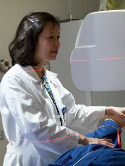| Abstract: |
Background: Axillary lymph node dissection (ALND) in patients with immunohistochemistry (IHC)-determined metastases to the sentinel lymph node (SLN) is controversial. The goal of this study was to examine factors associated with ALND in IHC-only patients. Methods: Retrospective review of an institutional SLN database from July 1997 to July 2003 was performed. We compared sociodemographic, pathologic, and therapeutic variables between IHC-only patients who had SLN biopsy alone and those that had ALND. Results: Our study group consisted of 171 patients with IHC-only metastases to the SLN. Young age, estrogen receptor negative status, high Memorial Sloan-Kettering Cancer Center nomogram score, and chemotherapy were associated with ALND. Among patients who had ALND (n = 95), 18% had a positive non-SLN. Rates of systemic therapy were similar between those with and without positive non-SLNs at ALND. No axillary recurrences were observed in this series with a median follow-up of 6.4 years. The percentage of patients who were recurrence-free after 5 years was 97% (95% confidence interval, 92.1-98.6). Conclusions: On the basis of our findings and the lack of prospective randomized data, the practice of selectively limiting ALND to IHC-only patients thought to be at high risk and to patients for whom the identification of additional positive nodes may change systemic therapy recommendations seems to be a safe and reasonable approach. © 2009 Society of Surgical Oncology. |
| Keywords: |
immunohistochemistry; adult; controlled study; treatment outcome; aged; aged, 80 and over; middle aged; survival rate; retrospective studies; major clinical study; histopathology; follow up; follow-up studies; lymph node metastasis; lymph node dissection; lymphatic metastasis; lymph node excision; prospective studies; sentinel lymph node biopsy; demography; neoplasm recurrence, local; breast cancer; tumor volume; epidermal growth factor receptor 2; breast neoplasms; retrospective study; risk factor; high risk patient; risk assessment; axillary lymph node; immunoenzyme techniques; predictive validity; comorbidity; receptor, erbb-2; receptors, estrogen; receptors, progesterone; axilla; estrogen receptor; progesterone receptor; carcinoma, ductal, breast; carcinoma, lobular
|











